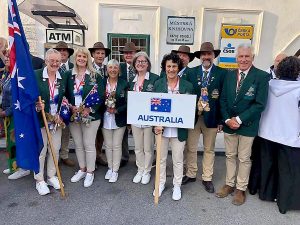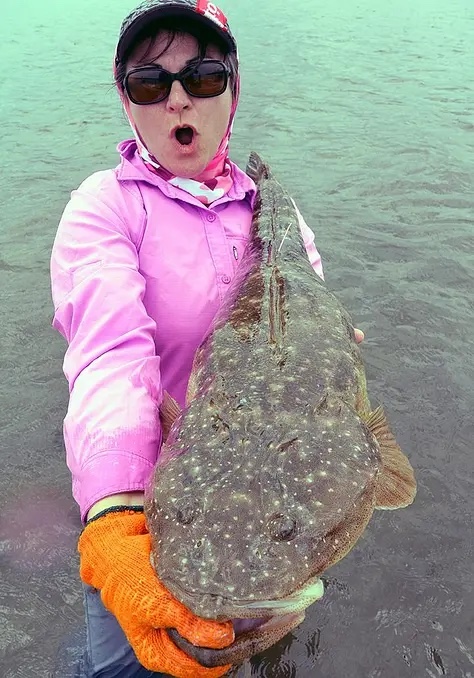Yet so many people scoff when I say so. Why?”
- Jo StarlingDid you know:
- The Australian Ladies Fly Fishing Team placed third in the 2024 Ladies World Fly Fishing Championships in May, 2024— being the first Australian fly fishing team to bring home a medal in 20 years?
- In 1992, Australian Dave Wesson became the only non-European to win the World Freshwater Angling Championships?
- Australia has a team competing in the World Bass Championships in Italy this October?
- All represent our country without any sports funding assistance?
Our beloved pastime draws millions of Australians outdoors for some valuable fresh air adventure and rejuvenation each year. Our motivations are as varied as the waterways we fish — some seek solitude and reflection; some quality family time; others want the excuse to get away with like-minded mates; still others yearn for challenge and competition (whether it be with themselves or others). Regardless of the reason we fish, the fact that it’s good for us is undisputed.
I don’t need to bang on about the physical and mental benefits of recreational fishing here — if you’re reading this, you’re undoubtedly already sold on those. But have you ever come up against pushback if, and when, you suggest recreational fishing is a sport?
For me, fishing is not just a pastime. It’s my sport of choice. Yet so many people scoff when I say so. Why?
Despite its popularity and what we know about the physical and mental benefits, the question remains: why isn’t fishing recognised as a sport in Australia, and what could change if it were?

The Australian Ladies and Australian Masters teams at the march out for their respective 2024 World Championships in Slovakia.
Is Fishing a Sport?
Fishing takes many forms, from leisurely picnic outings with the family to high-stakes competitive tournaments. It involves skill, patience, and often, physical exertion — traits commonly associated with sports. Our top-tier tournaments demand significant expertise and endurance, just like many recognised sports.
In comparing fishing to other sports, it seems clear to me that many parallels exist. Activities such as archery, shooting, and even frizbee (flying disc) are recognised as sports despite varying degrees of physical exertion. Fishing, with its competitive and skill-based nature, aligns well with these examples… surely it too qualifies as a sport?!
Not according to the Australian government.

Tournament bream anglers like Jamie McKeown travel long distances to challenge themselves … and to pocket some prize money.
(Photo courtesy Steve Morgan)
What Defines a Sport?
To understand the battleground of this debate, I’ve been researching the parameters used by governing bodies to determine what qualifies as a sport. Generally, sports involve physical exertion and skill, are competitive, and have an element of institutional recognition.
The nationally agreed definition of sport is “a human activity involving physical exertion and skill as the primary focus of the activity, with elements of competition where rules and patterns of behaviour governing the activity exist formally though organisations and is generally recognised as a sport.”
According to the International Olympic Committee (IOC) and the Australian Sports Commission (ASC), a sport typically includes:
- Physical Exertion and Skill: Engaging physical activity that requires skill and training.
- Competitive Aspect: Structured competitions with rules and scoring systems.
- Institutional Recognition: Formal acknowledgment by sports bodies and associations.
Fishing, particularly in its competitive forms, meets these criteria. It requires skill, physical effort, and features structured competitions.
I reached out to renowned Australian bass angler, Matthew Langford to get his perspective on fishing as a sport. After consideration, he came back to me with “Fishing is not as simple as throwing in a line and catching. There’s preparation, research, following seasonal trends, using specific techniques, using technology, understanding how lures work, knowing where your lure is, what you’re imitating. There’s a huge mental side to decision making and knowing what to do and when. Fitness is a factor too, being physically fit and mentally focused. There’s so many elements to put together to get the desired outcome. It’s just as demanding as most other sports.”
Yet, the lack of formal recognition by sports authorities in Australia remains a significant barrier.
Fishing Isn’t Recognised as a Sport in Australia.
Despite its alignment with the official sports criteria, fishing is not officially recognised as a sport in Australia, categorised instead as a recreational pursuit. This is influenced by public perception, where fishing is seen more as a leisure activity — we fishers are often referred to as “hobbyists”, not “sportspeople”. I, for one, take exception to this term.

Few could question the physical exertion, skill, training investment, or competitive nature of tournament anglers such as Matthew Langford, or the existence of structure competitions, rules and scoring systems in our tournaments.
Several barriers contribute to our lack of recognition:
- Competitive Structure: Australia lacks a robust, formalised competitive fishing structure compared to countries where fishing is recognised as a sport.
- Regulations and Rules: The absence of standardised regulations and governing bodies hampers our recognition.
- Biases and Misconceptions: Misconceptions about fishing being a passive activity contribute to its lack of acceptance as a sport.
That last one is a particular challenge because it’s a matter of opinion, and other sports may prefer we remain unrecognised. Why? Because the funding pool for sporting grants is finite. The more sports that qualify for funding, the smaller every sports piece of pie is. Thus, we will continue to get push-back.
In contrast to Australia, countries like the USA and several European nations have well-established fishing tournaments and associations, promoting fishing as a legitimate sport. You need only tune in to watch our own Carl Jocumsen in the Bass Elites to witness how big fishing is in the States! And it’s similar in international fly fishing circles.
When my good friend, Rebecca Bailey, returned from the Commonwealth Championships last year, she was amazed at the intensity of the European national teams, compared to our own. Competitive fishing is serious business for other countries.
As a result,fishers in these countries not only have access to sporting grants, but they receive greater support for their fishing economy and stronger recognition of their habitat protection work
Of course, the “Olympic” level of intensity isn’t for everyone, and some might say “it’s just not fishing”, but not everyone plays cricket at an elite level either. The fact is some people thrive in that environment. That’s what it takes to be world-class.

Try telling Carl Jocumsen (pictured at weigh-in at Guntersville Lake, Alabama in 2015) that fishing isn’t a sport! The Bassmaster Elite Series of the US generates a multi-million dollar economic return.
What Would Change if Fishing Was Recognised as a Sport in Australia?
Recognising fishing as a sport in Australia could bring significant changes across various sectors:
Institutional and Legal Changes
- National Sports Funding: Fishing could receive funding and support from national sports programs, boosting its development and infrastructure.
- Official Sports Bodies: Formation of governing bodies to oversee competitive fishing, ensuring standardised rules and fairness.
Economic and Social Impacts
- Sponsorship and Investment: Increased opportunities for sponsorships and investments, benefiting local businesses and communities.
- Tourism and Local Economies: Enhanced tourism through national and international fishing tournaments, stimulating local economies.
- Community Engagement: Greater community involvement and participation, fostering a sense of unity and promoting outdoor activities.
- Environmental Value: Deeper recognition of the value of healthy waterways as an economic resource for attracting international competition.
Cultural Shifts
- Perception Change: Shifting public perception of fishing from a casual pastime to a respected sport.
- Impact on Enthusiasts: Increased recognition and support for fishing enthusiasts and professionals, encouraging more people to take up the activity.
The debate over whether fishing should be recognised as a sport in Australia is likely to percolate for some time yet. While fishing meets many criteria of a sport, public perception and institutional recognition stand in our way. My personal belief is that this is a barrow worth pushing.
Acknowledging fishing as a sport will bring multiple benefits, and would go a long way to encouraging more young people to take up this incredibly healthy life-long pursuit.
And let’s face it, if flying disc athletes qualify for sporting grants, why shouldn’t our elite Aussie anglers?
Until next time… FISH ON!


For three decades Jo has worked with businesses and personalities, helping them to promote themselves in one form or another, whether through graphic design, advertising, promotions or marketing.
She has owned a fishing rod for just as long, but it’s only been in this new century that it hasn’t been allowed to gather dust.
Jo is a passionate advocate for the sport of fishing and its promotion as a healthy lifestyle for women.
To find out more about Jo visit her website HERE
Or you can visit her Fishtopia Web site HERE or on the banner below.
Jo is also the founder and National President of the Women’s Recreational Fishing League (WRFL) Inc. The work they do is very important in balancing the participation ratios of fishing in Australia, thus making the collective voices of Aussie anglers more harmonious and powerful, as well as shoring up the economy of the sector. For more information visit their Website at womensrecfishingleague.org











